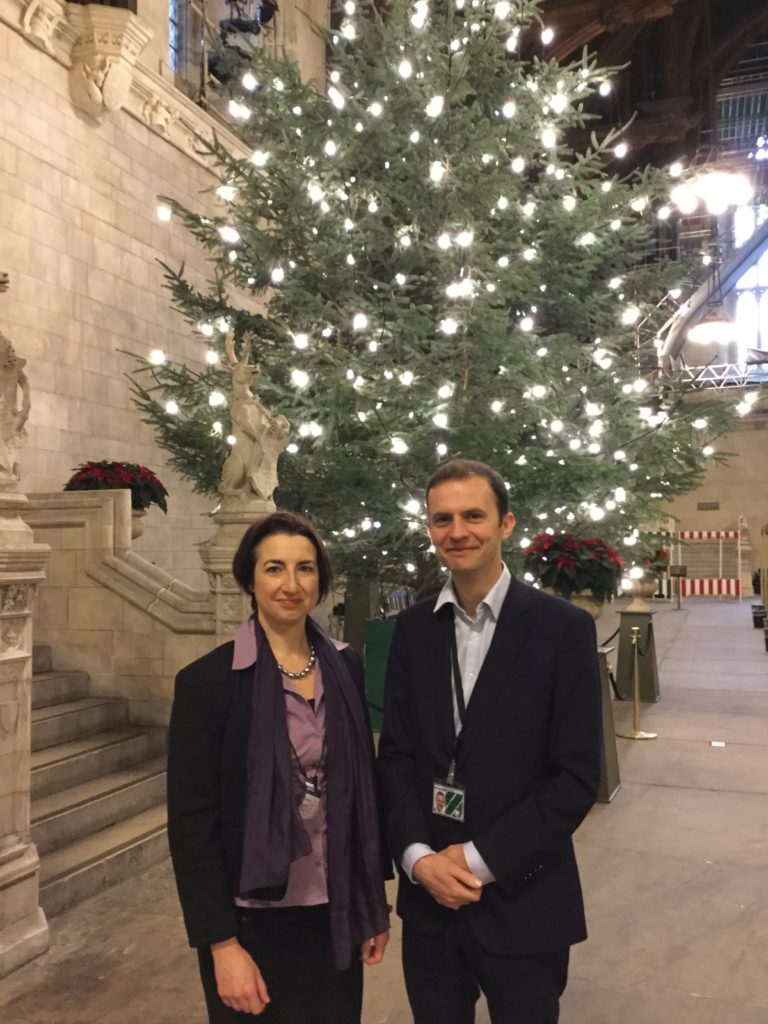What an incredible experience! It is not often that something can change quite drastically your way of thinking. I never imagined I would get so much out of the Royal Society Pairing Scheme.
For context, it is worth keeping in mind the timing of the events: 4th -7th December, which can easily be one
of the craziest week ever in the Parliament (even for the post-Brexit era standards). An announced deal with the EU lasted for only few hours before being rejected by the DUP while David Davis was further losing credibility over Brexit risk assessment, not to mention Trump’s decision to move the US Embassy to Jerusalem. This situation meant that our paired politicians and civil servants were even busier than usual.
I was paired with my local MP, Stephen Gethins (see picture in Westminster Hall) and could see first-hand how busy he is. I was invited to be present at all meetings that ranged from phone calls to an ambassador, parliamentarians from foreign countries and representative for UK organizations. These started in the morning, only few hours after Stephen voted in Parliament the night before. I also assisted to debates of selected committees and even got a ticket for Prime Minister Questions. In the evening I attended receptions hosted by the Secretary of State for Scotland and the Foreign Office. Definitely being an MP is not a 9-5 job. Typically, an MP has to deal with a large number of issues that are not necessarily related to the immediate agenda of their party. This requires switching discussions from international relationships to local businesses. I was surprised to see how limited support staff they get but equally impressed by their dedication. All these meetings also showed me that MPs are more accessible than what I would have imagined and highlighted the importance of face-to-face interactions to get the message through.
Typically, an MP has to deal with a large number of issues that are not necessarily related to the immediate agenda of their party. This requires switching discussions from international relationships to local businesses. I was surprised to see how limited support staff they get but equally impressed by their dedication. All these meetings also showed me that MPs are more accessible than what I would have imagined and highlighted the importance of face-to-face interactions to get the message through.
In addition to shadowing our paired MPs, the group of participants, about 40 of us from all over the UK, disciplines and career stages, came together for a series of informative and eye-opening sessions. These included a mock select committee with Lord Patel and Q&A with Prof Chris Whitty.The most compelling single thing I have learnt is that policy making is not as straightforward as I imagined. “All the evidence is out there why not use it for informing policies?” Easy, no? This would seem the most obvious choice to most of us, but there are many other factors to be taken into account. We know well that public opinion matters but maybe we do not appreciate *how* much it matters. The government can draw from an army of advisers from the parliament (especially from the House of Lords) and civil servants who are doing the best possible job, often on thigh time constraints. As scientists we know how long it takes to do research, to write about our findings, and how frustrating it can be to comply with burocracy and processes. Imagine having to deal with that in a window of few hours. The extent of informed advice and expertise available to politicians is much wider than what I imagined. And it has been reassuring to see that the experts are consulted and their advice taken into account.
However, evidence is not the only element contributing to policies. It is clear that until the public also start forming their opinions on the basis of evidence it will be very difficult to make progress in this area as governments ultimately will respond to their electorate and their mandate.
Obviously there cannot be an easy fix for such a complex problem, but we can start looking at what we can do as scientists. First of all, it is important to get an understanding of how policy making actually works. Before going to London, the Royal Society provided me with a very informative reading list. I did my homework and gone through it, but attending the sessions was a complete revelation. So, my suggestion number #1 is to join this Royal Society Pairing Scheme to gain a good grasp on how evidence is used when deciding policies. Suggestion number #2 is that we need to engage effectively with the public. It cannot be emphasised enough how important it is to establish trust, respect and positive channels of communication between the experts and our audiences.
For more insights check out #SciWestminster17 and make sure you do not miss #SciWestminster18!
I am extremely grateful to the Royal Society for this opportunity, especially to Joe Edwards, Becky Purvis and Luiz Guidi who organised the event and looked after us. We rarely say nice things about politicians, but shadowing Stephen Gethins went well beyond any expectations. Heartfelt thanks to Stephen and his team, especially Lindsey Alexander, who made this experience truly special. I’ll be looking forward to welcoming you in St Andrews.